In Christian theology and ecclesiology, apostles, particularly the Twelve Apostles (also known as the Twelve Disciples or simply the Twelve), were the primary disciples of Jesus according to the New Testament. During the life and ministry of Jesus in the 1st century AD, the apostles were his closest followers and became the primary teachers of the gospel message of Jesus. There is also an Eastern Christian tradition derived from the Gospel of Luke of there having been as many as seventy apostles during the time of Jesus' ministry. The commissioning of the Twelve Apostles during the ministry of Jesus is recorded in the Synoptic Gospels. After his resurrection, Jesus sent eleven of them (minus Judas Iscariot, who by then had died) by the Great Commission to spread his teachings to all nations. This event has been called the Dispersion of the Apostles. In the Pauline epistles, Paul, although not one of the original twelve, described himself as an apostle, saying he was called by the resurrected Jesus himself during his Road to Damascus event. He later describes himself as "the apostle of the Gentiles". In the Book of Acts he and Barnabas were allotted the roles of apostle in the church. In modern usage, missionaries under Pentecostal movements often refer to themselves as apostles, a practice which stems from the Latin equivalent of apostle, i.e. missio, the source of the English word missionary. For example, Saint Patrick (AD 373–463) was the "Apostle of Ireland", Saint Boniface (680–755) was the "Apostle to the Germans", Saint José de Anchieta (1534–1597) was the "Apostle of Brazil" and Saint Peter of Betancur (1626–1667) was the "Apostle of Guatemala". The Church of Jesus Christ of Latter-Day Saints has always had, among its leadership, twelve individuals identified as apostles. Their primary role is to teach and testify of Jesus throughout the world. The period of early Christianity during the lifetimes of the apostles is called the Apostolic Age. During the 1st century AD, the apostles established churches throughout the territories of the Roman Empire and, according to tradition, through the Middle East, Africa, and India . Of the tombs of the apostles, all but two are claimed by premises of the Catholic Church, half of them located in the Diocese of Rome.
- pentecostal
- ecclesiology
- missionary
1. Etymology
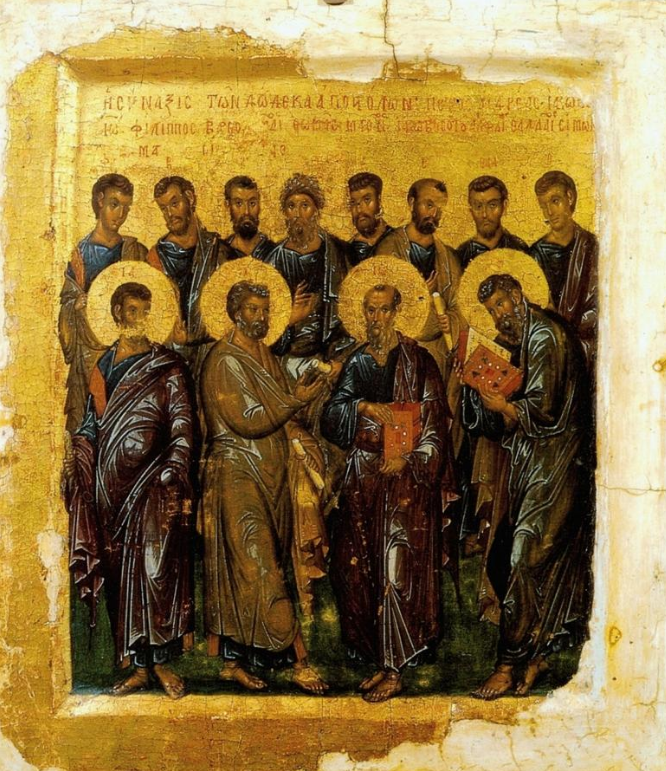
The term apostle comes from the Greek apóstolos (ἀπόστολος) – formed from the prefix apó- (ἀπό-, 'from') and root stéllō (στέλλω, 'I send, I depart') – originally meaning 'messenger, envoy'. It has, however, a stronger sense than the word messenger, and is closer to a 'delegate'.[1]
Bauer's Lexicon argues that its Christian usage translated a Jewish position known in Hebrew as the sheliach (שליח). This ecclesiastical meaning of the word was later translated into Latin as missio, the source of the English "missionary".[2]
2. Biblical Narratives
Later in the Gospel narratives the Twelve Apostles are described as having been commissioned to preach the Gospel to "all the nations,"[3] regardless of whether Jew or Gentile.[4] Paul emphasized the important role of the apostles in the church of God when he said that the household of God is "built upon the foundation of apostles and prophets, Christ Jesus himself being the cornerstone."[Ephesians 2:19–20]
2.1. Calling by Jesus
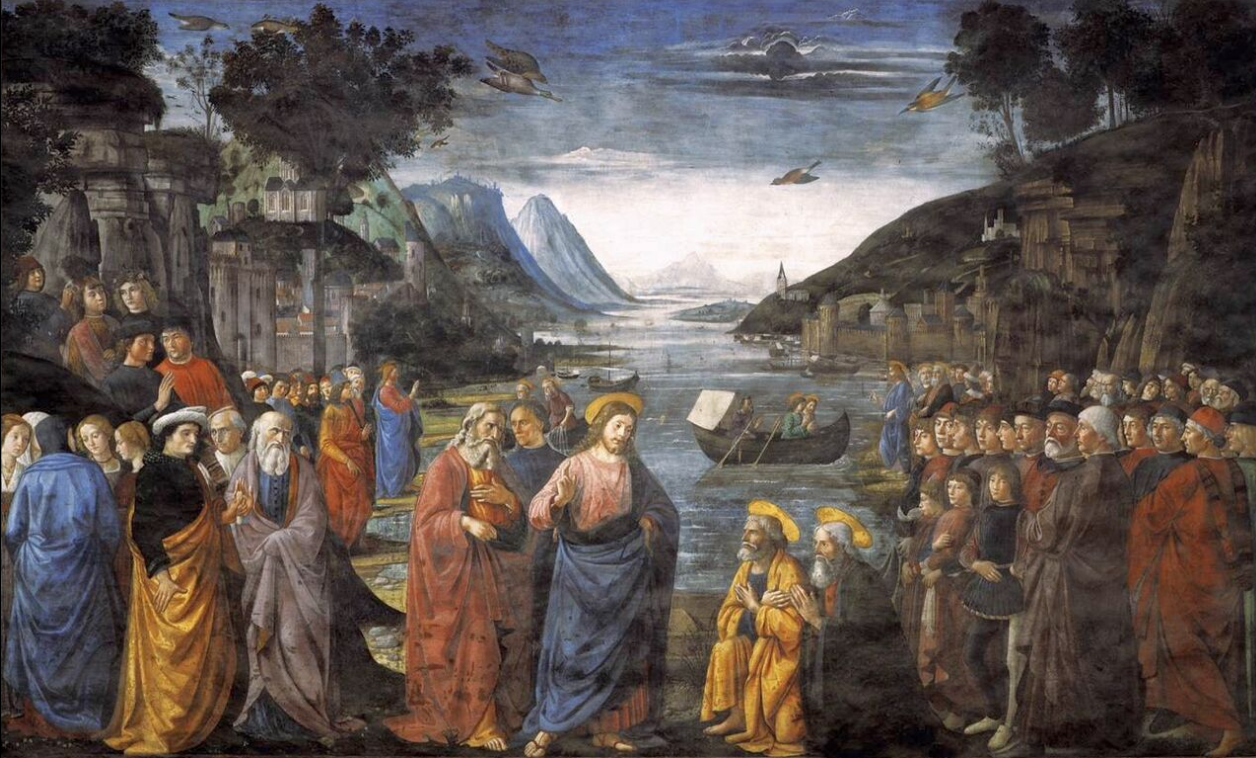
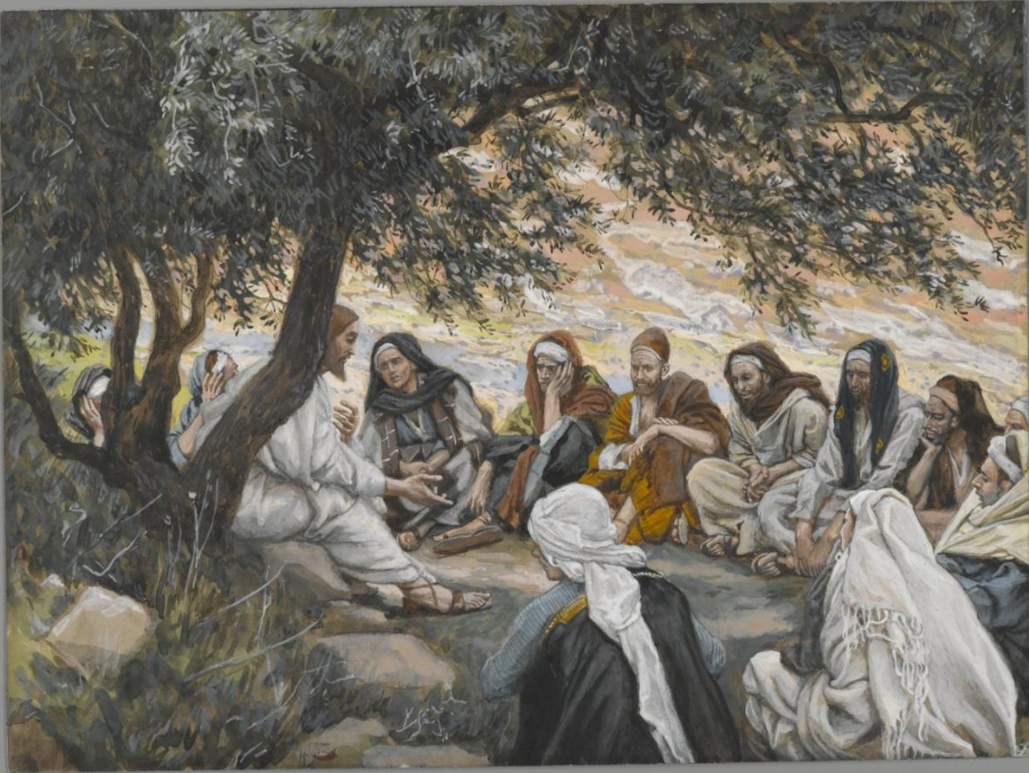
The three Synoptic Gospels record the circumstances in which some of the disciples were recruited, Matthew only describing the recruitment of Simon, Andrew, James, and John.
Despite Jesus only briefly requesting that they join him, they are all described as immediately consenting and abandoning their nets to do so. The immediacy of their consent has been viewed as an example of divine power, although this is not stated in the text. The more ordinary explanation is that Jesus was friends with them beforehand, as implied by the Gospel of John, which states that Peter (Simon) and Andrew were disciples of John the Baptist, and started following Jesus as soon as Jesus had been baptized.[5]
Albright and Mann extrapolate from Simon and Andrew's abandonment of their nets that Matthew is emphasizing the importance of renunciation by converting to Christianity, since fishing was profitable, although required large start-up costs, and abandoning everything would have been an important sacrifice. Regardless, Simon and Andrew's abandonment of what were effectively their most important worldly possessions has been taken as a model by later Christian ascetics.
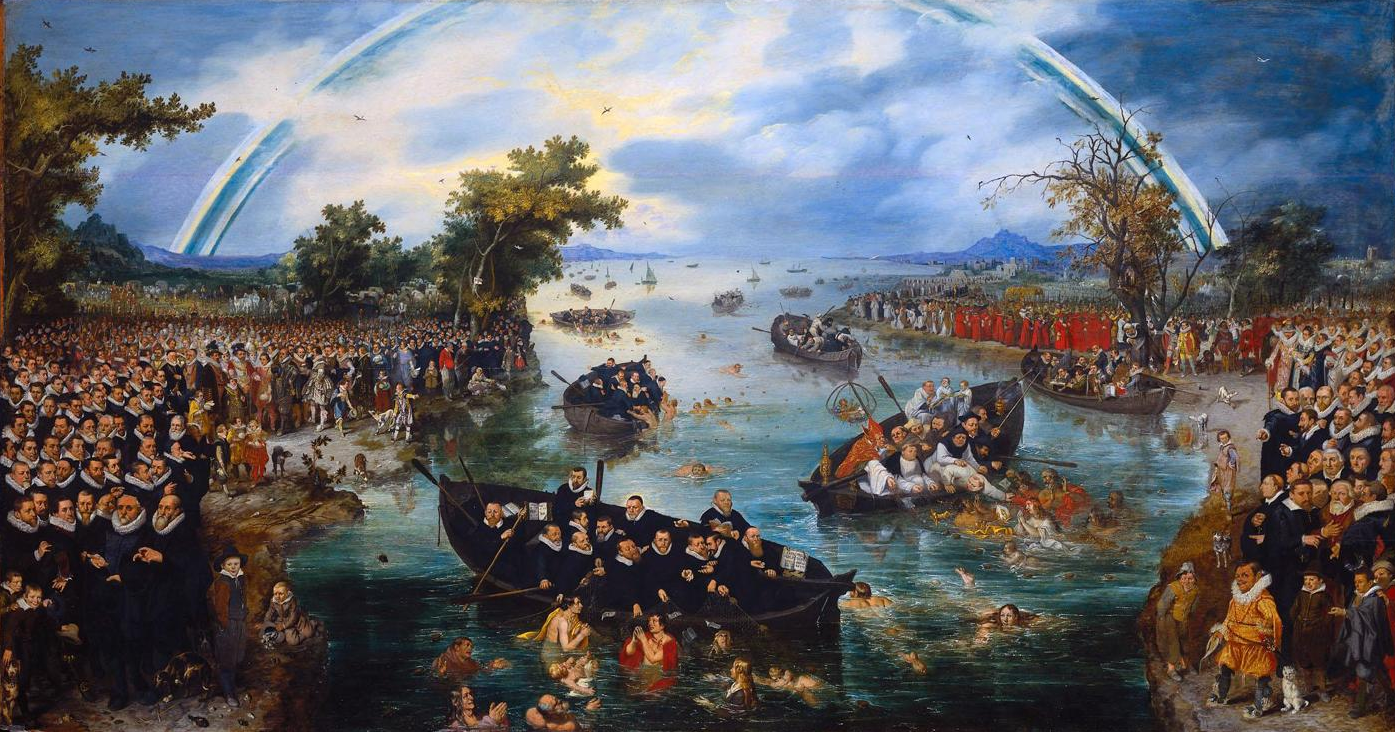
Matthew describes Jesus meeting James and John, also fishermen and brothers, very shortly after recruiting Simon and Andrew. Matthew and Mark identify James and John as sons of Zebedee. Luke adds to Matthew and Mark that James and John worked as a team with Simon and Andrew. Matthew states that at the time of the encounter, James and John were repairing their nets, but readily joined Jesus without hesitation.[6]
This parallels the accounts of Mark and Luke, but Matthew implies that the men have also abandoned their father (since he is present in the boat they abandon behind them), and Carter feels this should be interpreted to mean that Matthew's view of Jesus is one of a figure rejecting the traditional patriarchal structure of society, where the father had command over his children; most scholars, however, just interpret it to mean that Matthew intended these two to be seen as even more devoted than the other pair, or that Jesus expected the imminent coming of the kingdom.[7]
The Synoptic Gospels go on to describe that later in Jesus' ministry he noticed a tax collector in his booth. The tax collector, called Matthew in Matthew 9:9, Levi in Mark 2:14 and Luke 5:27, is asked by Jesus to become one of his disciples. Matthew/Levi is stated to have accepted and then invited Jesus for a meal with his friends. Tax collectors were seen as villains in Jewish society, and the Pharisees are described as asking Jesus why he is having a meal with such disreputable people. The reply Jesus gave is now well known: "it is not the healthy who need a doctor, but the sick. I have not come to call the righteous, but sinners to repentance."[8]
2.2. Commissioning of the Twelve Apostles
The commissioning of the Twelve Apostles is an episode in the ministry of Jesus that appears in all three Synoptic Gospels: Matthew 10:1–4, Mark 3:13–19 and Luke 6:12–16. It relates the initial selection of the Twelve Apostles among the disciples of Jesus.[9][10]
According to Luke:
One of those days Jesus went out to a mountainside to pray, and spent the night praying to God. When morning came, he called his disciples to him and chose twelve of them, whom he also designated apostles: Simon (whom he named Peter), his brother Andrew, James, John, Philip, Bartholomew, Matthew, Thomas, James son of Alphaeus, Simon who was called the Zealot, Judas son of James, and Judas Iscariot, who became a traitor.[11]
—Luke 6:12–16
In the Gospel of Matthew, this event takes place shortly before the miracle of the man with a withered hand. In the gospels of Mark and of Luke, it appears shortly after that miracle.[12]
2.3. Replacement of Judas Iscariot
After he betrayed Christ (and then in guilt committed suicide before Christ's resurrection, one Gospel recounts), the apostles numbered eleven. When Jesus had been taken up from them, in preparation for the coming of the Holy Spirit that he had promised them, Peter advised the brethren:
Judas, who was guide to those who took Jesus... For he was numbered with us, and received his portion in this ministry... For it is written in the book of Psalms, "Let his habitation be made desolate, Let no one dwell therein", and, "Let another take his office"... So one of the men who have accompanied us during all the time that the Lord Jesus went in and out among us, beginning from the baptism of John until the day he was taken up from us, must become with us a witness to his resurrection.—Acts 1:15–22
So, between the Ascension of Jesus and the day of Pentecost, the remaining apostles elected a twelfth apostle by casting lots, a traditional Israelite way to determine the will of God (see Proverbs 16:33). The lot fell upon Matthias.[13]
Paul the Apostle in his First Epistle to the Corinthians, appears to give the first historical reference to the Twelve Apostles: "For I delivered to you as of first importance what I also received: that Christ died for our sins in accordance with the Scriptures, that he was buried, that he was raised on the third day in accordance with the Scriptures, and that he appeared to Cephas, then to the twelve" (1 Cor 3–5).
2.4. Paul, Apostle of the Gentiles
Although not one of the apostles commissioned during the life of Jesus, Paul, a Jew named Saul of Tarsus, claimed a special commission from the post-ascension Jesus as "the apostle of the Gentiles",[Romans 11:13] to spread the gospel message after his conversion. In his writings, the epistles to Christian churches throughout the Levant, Paul did not restrict the term "apostle" to the twelve, and often refers to his mentor Barnabas as an apostle.[14]
In his writings, Paul, although not one of the original twelve, described himself as an apostle.[15] He was called by the resurrected Jesus himself during his Road to Damascus event. With Barnabas, he was allotted the role of apostle in the church.[Acts 13:2]
Since Paul claimed to have received a gospel not from teachings of the Twelve Apostles but solely and directly through personal revelations from the post-ascension Jesus,[16] after Jesus's death and resurrection (rather than before like the twelve), Paul was often obliged to defend his apostolic authority (1 Cor. 9:1 "Am I not an apostle?") and proclaim that he had seen and was anointed by Jesus while on the road to Damascus.
Paul considered himself perhaps inferior to the other apostles because he had originally persecuted Christ's followers[1 Cor. 15:9] while thinking he was not in the least inferior to those "super-apostles" and not lacking in "knowledge".[2 Cor. 11:5–6]
Paul referred to himself as the apostle of the Gentiles.[Rom 11:13] According to Paul's account in his Epistle to the Galatians, James, Peter and John in Jerusalem accepted the "grace" given to Paul and agreed that Paul and Barnabas should go to the Gentiles (specifically those not circumcised) and the three Apostles who "seemed to be pillars" to the circumcised.[Gal 2:7–9] Despite the Little Commission of Matthew 10, the Twelve Apostles did not limit their mission to solely Jews as Cornelius the Centurion is widely considered the first Gentile convert and he was converted by Peter, and the Great Commission of the resurrected Jesus is specifically to "all nations".
As the Catholic Encyclopedia states, "It is at once evident that in a Christian sense, everyone who had received a mission from God, or Christ, to man could be called 'Apostle'"; thus extending the original sense beyond the twelve.[1]
3. Islam
The Quranic account of the disciples (Arabic: الحواريون al-ḥawāriyyūn) of Jesus does not include their names, numbers, or any detailed accounts of their lives. Muslim exegesis, however, more-or-less agrees with the New Testament list and says that the disciples included Peter, Philip, Thomas, Bartholomew, Matthew, Andrew, James, Jude, John and Simon the Zealot.[17] Scholars generally draw a parallel with the disciples of Jesus and the companions of Muhammad, who followed Muhammad during his lifetime.[18]
4. Legacy
By the 2nd century AD, association with the apostles was esteemed as an evidence of authority. Churches that are believed to have been founded by one of the apostles are known as apostolic sees. Paul's epistles were accepted as scripture, and two of the four canonical gospels were associated with apostles, as were other New Testament works. Various Christian texts, such as the Didache and the Apostolic Constitutions, were attributed to the apostles. Bishops traced their lines of succession back to individual apostles, who were said to have dispersed from Jerusalem and established churches across great territories. Christian bishops have traditionally claimed authority deriving, by apostolic succession, from the Twelve.[14] Early Church Fathers who came to be associated with apostles – such as Pope Clement I with St. Peter – are referred to as the Apostolic Fathers. The Apostles' Creed, popular in the West, was said to have been composed by the apostles themselves.
5. Deaths
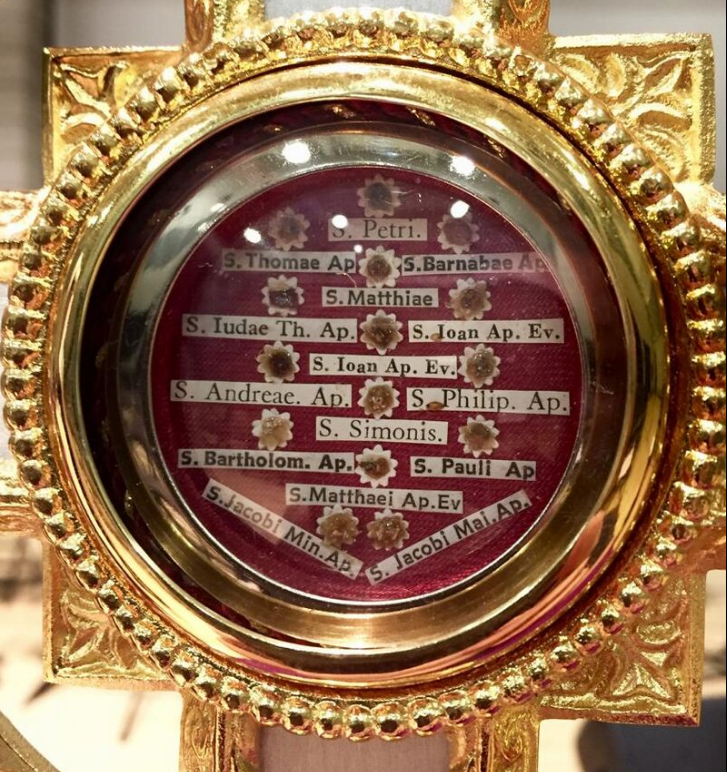
Of the Twelve Apostles to hold the title after Matthias' selection, Christian tradition has generally passed down that all of the Twelve Apostles except one were martyred, with only John surviving into old age.[20] Only the death of James, son of Zebedee is described in the New Testament. (Acts 12:1–2)[21]
Matthew 27:5 says that Judas Iscariot threw the silver he received for betraying Jesus down in the Temple, then went and hanged himself. Acts 1:18 says that he purchased a field, then "falling headlong he burst open in the middle and all his bowels gushed out".
According to the 18th-century historian Edward Gibbon, early Christians (second half of the second century and first half of the third century) believed that only Peter, Paul, and James, son of Zebedee, were martyred.[22] The remainder of the claims of martyred apostles do not rely upon historical or biblical evidence, but only on tradition.[23][24]
5.1. Tombs of the Apostles
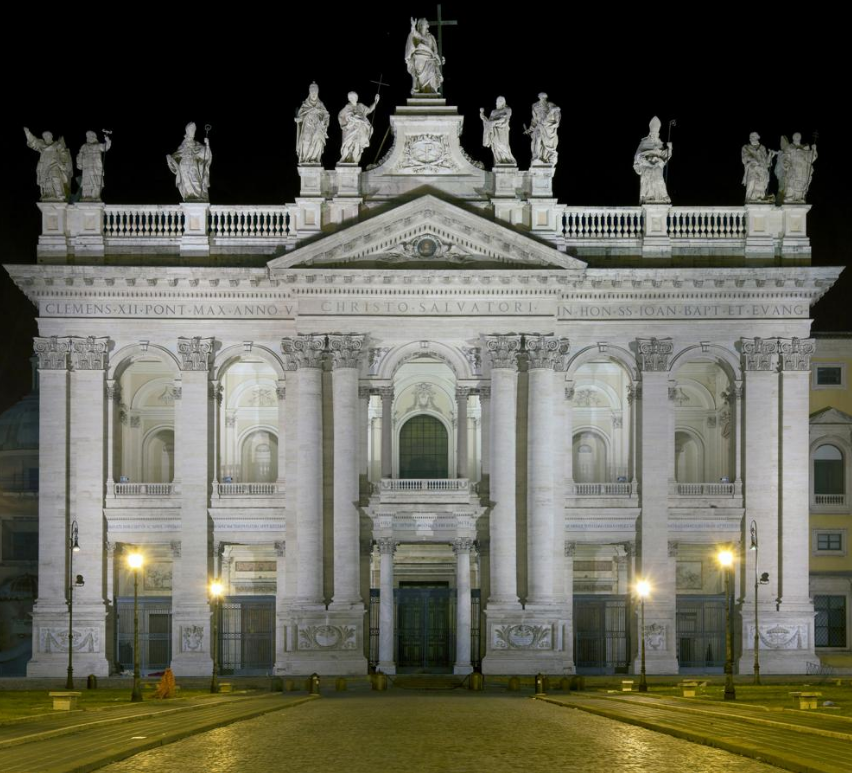
The relics of the apostles are claimed by various Churches, many in Italy.[26]
- Peter: buried in St. Peter's Basilica in Vatican City, Rome, Italy
- Andrew: buried in St. Andrew's Cathedral, Patras, Greece
- James the Great: buried in Santiago de Compostela Cathedral in Santiago de Compostela, Galicia, Spain
- John: buried in the Basilica of St. John in Ephesus, Turkey
- Philip: buried in the Church of the Holy Apostles in Rome or possibly Hierapolis, near Denizli, Turkey[27]
- Bartholomew: buried in the Basilica of Benevento, Italy, or Basilica of St. Bartholomew on the Island, Rome, Italy
- Matthew: buried in the Salerno Cathedral, Salerno, Italy
- James, son of Alpheus: buried in the Cathedral of St. James in Jerusalem or the Church of the Holy Apostles in Rome
- Thomas: buried in the San Thome Basilica in Chennai, India or in the Basilica of St. Thomas the Apostle in Ortona, Abruzzo, Italy
- Simon: buried in St. Peter's Basilica in Rome under the St. Joseph altar with St. Jude
- Jude Thaddeus: buried in St. Peter's Basilica under the St. Joseph altar with St. Simon; two bones (relics) located at National Shrine of St Jude in Chicago , Illinois
- Matthias: buried in the St. Matthias' Abbey in Trier, Rhineland-Palatinate, Germany
- Paul: relics located in the Basilica of Saint Paul Outside the Walls in Rome
- Judas Iscariot: remains located in Akeldama, near the Valley of Hinnom, in Jerusalem
6. List of the Twelve Apostles as Identified by the Bible
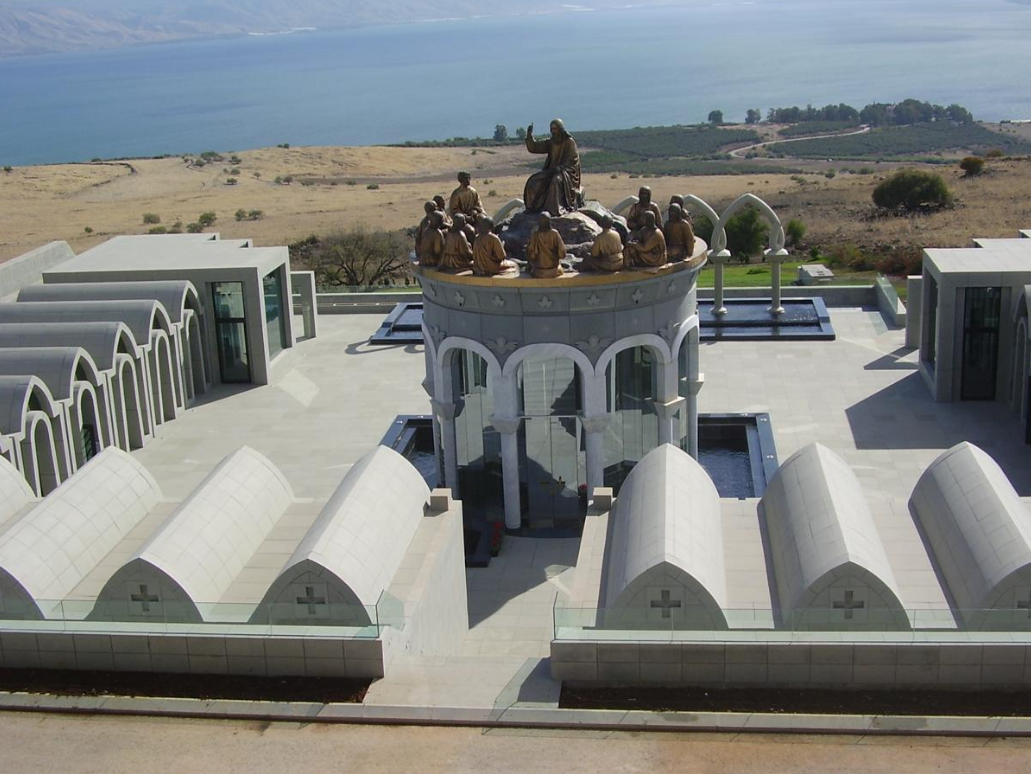
Each of the four listings of apostles in the New Testament (Mark 3:13–19, Matthew 10:1–4, Luke 6:12–16, and Acts 1:13) indicate that all the apostles were men. The canonical gospels and the book of Acts give varying names of the Twelve Apostles. The list in the Gospel of Luke differs from Matthew and Mark on one point. It lists "Judas, the son of James" instead of "Thaddaeus".[28]
Unlike the Synoptic Gospels, the Gospel of John does not offer a formal list of apostles. Although it refers to "the Twelve" (John 6:67–71), the gospel does not present any elaboration of who these twelve actually were, and the author of the Gospel of John does not mention them all by name. There is also no separation of the terms "apostles" and "disciples" in John.
| Gospel of Matthew[29] | Gospel of Mark[30] | Gospel of Luke[31] | Gospel of John | Acts of the Apostles[32] |
|---|---|---|---|---|
| Simon ("who is called Peter") | Simon ("he surnamed Peter") | Simon ("whom named Peter") | Simon Peter[33] (“Cephas, which means Peter”) | Peter |
| Andrew ("his [Peter's] brother") | Andrew | Andrew ("his [Peter's] brother") | Andrew ("Simon Peter's brother") | Andrew |
| James ("son of Zebedee") | James ("son of Zebedee") / one of the "Boanerges" | James | one of the "sons of Zebedee" | James |
| John ("his [James's] brother") | John ("brother of James") / one of the "Boanerges" | John | one of the "sons of Zebedee" / the "disciple whom Jesus loved" [34] | John |
| Philip | Philip | Philip | Philip | Philip |
| Bartholomew | Bartholomew | Bartholomew | Nathanael | Bartholomew |
| Thomas | Thomas | Thomas | Thomas ("also called Didymus")[35] | Thomas |
| Matthew ("the publican") | Matthew/Levi | Matthew/Levi | not mentioned | Matthew |
| James ("son of Alphaeus") | James ("son of Alphaeus") | James ("son of Alphaeus") | not mentioned | James ("son of Alphaeus") |
| Thaddaeus (or "Lebbaeus"); called "Judas the Zealot" in some translations[36] | Thaddaeus | Judas ("son of James, referred to as brother in some translations") | Judas ("not Iscariot")[37] | Judas ("son of James, referred to as brother in some translations") |
| Simon ("the Canaanite") | Simon ("the Cananaean") | Simon ("who was called the Zealot") | not mentioned | Simon ("the Zealot") |
| Judas Iscariot | Judas Iscariot | Judas Iscariot | Judas ("son of Simon Iscariot")[38] | (Judas replaced by Matthias) |
6.1. Other Apostles Mentioned in the New Testament
| Person called apostle | Where in Scripture | Notes |
|---|---|---|
| Barnabas | Acts 14:14 | — |
| Andronicus and Junia | Rom 16:7 | Paul states that Andronicus and Junia were "of note among the apostles." This has been traditionally interpreted in one of two ways:
If the first view is correct then Paul may be referring to a female apostle[40][41] – the Greek name (Iounian) is in the accusative and could be either Junia (a woman) or Junias (a man).[42] Later manuscripts add accents to make it unambiguously Junias, however while "Junia" was a common name, "Junias" was not,[41] and both options are favored by different Bible translations. In the second view, it is believed that Paul is simply making mention of the outstanding character of these two people which was acknowledged by the apostles. Historically it has been virtually impossible to tell which of the two views were correct. The second view, in recent years, has been defended from a scholarly perspective by Daniel Wallace and Michael Burer.[43] |
| Silas | 1 Thes. 1:1, 2:6 | Referred to as one along with Timothy and Paul, he also performs the functioning of an apostle as Paul's companion in Paul's second missionary journey in Acts 15:40ff. |
| Timothy | 1 Thes. 1:1, 2:6 | Timothy is referred to as an apostle along with Silas and Paul. However, in 2 Cor. 1:1 he is only called a "brother" when Paul refers to himself as "an apostle of Christ". Timothy performs many of the functions of an apostle in the commissioning of Paul in 1st and 2nd Timothy, though in those epistles Paul refers to him as his "son" in the faith. |
| Apollos | 1 Cor. 4:9 | Included among "us apostles" along with Paul and Cephas (Peter). (see also: 4:6, 3:22, and 3:4–6) |
6.2. The Seventy Disciples
The "seventy disciples" or "seventy-two disciples" (known in the Eastern Christian traditions as the "Seventy Apostles") were early emissaries of Jesus mentioned in the Gospel of Luke 10:1–24. According to Luke, the only gospel in which they appear, Jesus appointed them and sent them out in pairs on a specific mission which is detailed in the text.
In Western Christianity, they are usually referred to as disciples,[44] whereas in Eastern Christianity they are usually referred to as Apostles.[45] Using the original Greek words, both titles are descriptive, as an apostle is one sent on a mission (the Greek uses the verb form: apesteilen) whereas a disciple is a student, but the two traditions differ on the scope of the words apostle and disciple.
The content is sourced from: https://handwiki.org/wiki/Religion:Apostles_in_Christianity
References
- "Catholic Encyclopedia: Apostles". http://www.newadvent.org/cathen/01626c.htm.
- Angus Stevenson (19 August 2010). Oxford Dictionary of English. OUP Oxford. p. 1133. ISBN 978-0-19-957112-3. https://books.google.com/books?id=anecAQAAQBAJ&pg=PA1133.
- Mt 28:19, Mk 13:10, and 16:15 https://www.biblegateway.com/passage/?search=Mt+28%3A19&version=NRSV
- Cf. also Acts 15:1–31, Galatians 2:7–9, Acts 1:4–8, and Acts 10:1–11:18. https://www.biblegateway.com/passage/?search=Acts+15%3A1%E2%80%9331&version=NRSV
- Jn 1:40–42 https://www.biblegateway.com/passage/?search=Jn+1%3A40%E2%80%9342&version=NRSV
- Mt 4:21 https://www.biblegateway.com/passage/?search=Mt+4%3A21&version=NRSV
- Meier, John P. (1994). Marginal Jew, II. Doubleday. ISBN 978-0385469920. https://archive.org/details/mentormessagemir00john.
- Mark 2:17. https://www.biblegateway.com/passage/?search=Mark+2%3A17&version=NRSV
- Riley, Harold. 1992. The First Gospel. ISBN:0-86554-409-3. p. 47.
- Mills, Watson E., and Roger Aubrey Bullard. 1998. Mercer Dictionary of the Bible. ISBN:0-86554-373-9. p. 48
- New International Version, online at Bible gateway http://www.biblegateway.com/passage/?search=luke%206:12-6:16&version=NIV
- Strauss, David Friedrich. 1860. The Life of Jesus. Published by Calvin Blanchard. p. 340.
- "Who were the 12 disciples?". http://www.bibleinfo.com/en/questions/who-were-twelve-disciples#replace-judas.
- "Apostle." Cross, F. L., ed. The Oxford Dictionary of the Christian Church. New York: Oxford University Press. 2005. ISBN:0-19-280290-9.
- Romans 1:1 https://www.biblegateway.com/passage/?search=Romans+1%3A1&version=NRSV
- cf. Gal 1:12; Acts 9:3–19, 9:26–27, 22:6–21, 26:12–23 https://www.biblegateway.com/passage/?search=Gal+1%3A12&version=NRSV
- Wheeler, A–Z of Prophets in Islam and Judaism, Disciples of Jesus, p. 86
- Wheeler, A–Z of Prophets in Islam and Judaism, Disciples of Jesus, p. 86.
- "Relics of the Passion". http://www.relictour.com/relics-of-the-passion.
- Mark A. Lamport (1 June 2018). Encyclopedia of Christianity in the Global South. Rowman & Littlefield Publishers. p. 27. ISBN 978-1-4422-7157-9. https://books.google.com/books?id=B6xVDwAAQBAJ&pg=PA27.
- "Who were the 12 disciples? | Bibleinfo.com". https://www.bibleinfo.com/en/questions/who-were-twelve-disciples.
- Gibbon, Edward (1826). "Chapter XVI. The Conduct of the Roman Government toward the Christians, from the Reign of Nero to that of Constantine". The history of the decline and fall of the Roman empire. II. New York: J. & J. Harper for Collins & Hanney. p. 20. https://books.google.com/books?id=FvQLAAAAYAAJ&pg=PA20. "27. In the time of Tertullian and Clemens of Alexandria the glory of martyrdom was confined to St. Peter, St. Paul and St. James. It was gradually bestowed on the rest of the apostles by the more recent Greeks, who prudently selected for the theatre of their preaching and sufferings some remote country beyond the limits of the Roman empire. See Mosheim, p. 81. and Tillemont, Memoires Ecclesiastiques, tom. i. part 3."
- "Were the Disciples Martyred for Believing the Resurrection? A Blast From the Past". https://ehrmanblog.org/were-the-disciples-martyred-for-believing-the-resurrection-a-blast-from-the-past/.
- Wills, Garry (10 March 2015). The Future of the Catholic Church with Pope Francis. Penguin Publishing Group. p. 49. ISBN 978-0-698-15765-1. https://books.google.com/books?id=A8XzAwAAQBAJ&pg=PT49. "(Candida Moss marshals the historical evidence to prove that "we simply don't know how any of the apostles died, much less whether they were martyred.")6" Citing Moss, Candida (5 March 2013). The Myth of Persecution: How Early Christians Invented a Story of Martyrdom. HarperCollins. p. 136. ISBN 978-0-06-210454-0. https://books.google.com/books?id=smddSvSxFScC.
- "Saints in Rome & Beyond!". http://www.saintsinrome.com/.
- "Welcome". http://www.saintsinrome.com/2013/08/welcome_6737.html.
- As stated in St. Philips wiki article
- For more information, see Jude the Apostle.
- Matt 10:1–4 https://www.biblegateway.com/passage/?search=Matt+10%3A1%E2%80%934&version=NRSV
- Mark 3:13–19 https://www.biblegateway.com/passage/?search=Mark+3%3A13%E2%80%9319&version=NRSV
- Luke 6:12–16 https://www.biblegateway.com/passage/?search=Luke+6%3A12%E2%80%9316&version=NRSV
- Acts 1:13 https://www.biblegateway.com/passage/?search=Acts+1%3A13&version=NRSV
- John 6:67–71 https://www.biblegateway.com/passage/?search=John+6%3A67%E2%80%9371&version=NRSV
- This is a traditional conflation of John the Apostle with John the Evangelist, currently disputed by many textual scholars.
- John 11:16John 20:24John 21:2 https://www.biblegateway.com/passage/?search=John+11%3A16&version=NRSV
- Bruce M. Metzger. A Textual Commentary on the Greek New Testament, Revised edition, Peabody, Massachusetts: Hendrickson Publishers, 2005 ISBN:978-1598561647, p. 21.
- John 14:22 https://www.biblegateway.com/passage/?search=John+14%3A22&version=NRSV
- John 6:67–71 https://www.biblegateway.com/passage/?search=John+6%3A67%E2%80%9371&version=NRSV
- May, Herbert G. and Bruce M. Metzger. The New Oxford Annotated Bible with the Apocrypha. 1977.
- Crossan, J. D. and Reed, J. L., In Search of Paul, Harper San Francisco (2004), pp. 115–16. ISBN:978-0-06-051457-0.
- Ehrman, Bart. Peter, Paul, and Mary Magdalene: The Followers of Jesus in History and Legend. Oxford University Press, US. 2006. ISBN:978-0-19-530013-0.
- CBMW "A Female Apostle?" , 26 June 2007 https://cbmw.org/uncategorized/a-female-apostle/
- See Daniel B. Wallace and Michael H. Burer, "Was Junia Really an Apostle?" NTS 47 (2001): 76–91.
- Catholic Encyclopedia: Disciple : "The disciples, in this disciples, in this context, are not the crowds of believers who flocked around Christ, but a smaller body of His followers. They are commonly identified with the seventy-two (seventy, according to the received Greek text, although several Greek manuscripts mention seventy-two, as does the Vulgate) referred to (Luke 10:1) as having been chosen by Jesus. The names of these disciples are given in several lists (Chronicon Paschale, and Pseudo-Dorotheus in Migne, P.G., XCII, 521–24; 543–45; 1061–65); but these lists are unfortunately worthless." http://www.newadvent.org/cathen/05029a.htm
- "Synaxis of the Seventy Apostles". oca.org. http://ocafs.oca.org/FeastSaintsLife.asp?FSID=100017.
